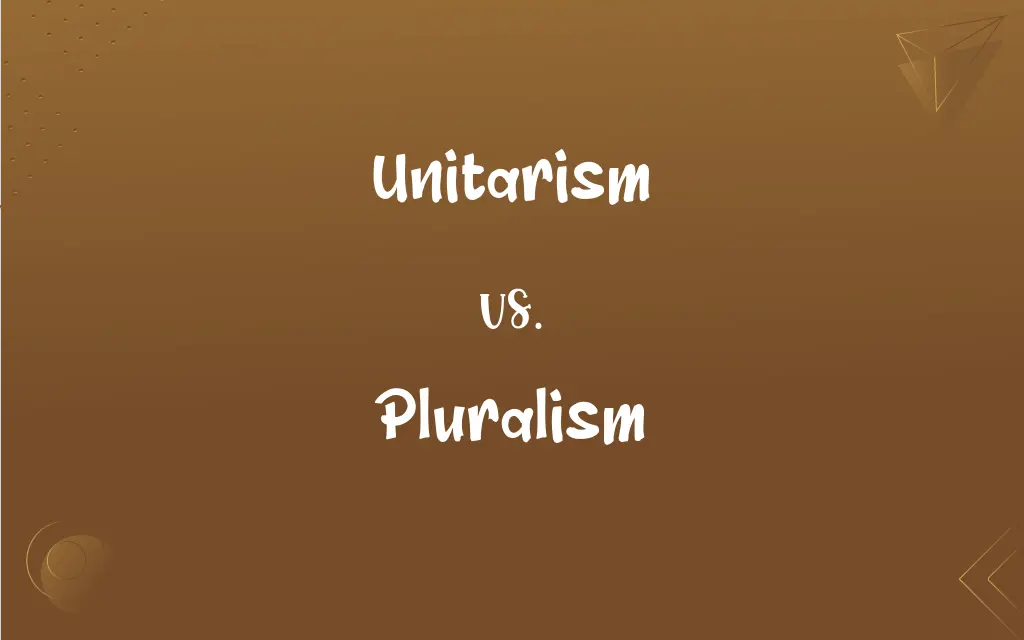Unitarism vs. Pluralism: What's the Difference?
Edited by Aimie Carlson || By Harlon Moss || Published on December 9, 2023
Unitarism is a belief in unified authority and organizational harmony. Pluralism is a belief in diverse, competing groups within an organization or society.

Key Differences
Unitarism emphasizes a cohesive, unified approach within an organization or a state, advocating for centralized authority and a singular focus. In contrast, pluralism champions the existence and healthy competition of multiple groups, each with their own perspectives and interests, within the same entity.
Unitarism is often associated with strong, centralized leadership, where decision-making is top-down and there's little room for dissent or alternative views. Pluralism, on the other hand, values the diversity of opinions and encourages decentralized decision-making, recognizing the legitimacy of different viewpoints and interests.
In a unitarist framework, organizational or societal goals are seen as homogenous and aligned, with everyone working towards the same objectives. Pluralism acknowledges that different groups or individuals within an organization or society may have differing, even conflicting, goals and priorities.
Under unitarism, conflicts are often viewed negatively, as disruptions to the harmony and unity of the organization or society. In a pluralist perspective, conflicts are seen as a natural and potentially productive part of balancing diverse interests and reaching more inclusive decisions.
In terms of policy and governance, unitarism tends to support policies that reinforce the central authority's vision and control. Pluralism advocates for policies that facilitate the representation and empowerment of various groups, ensuring a more equitable distribution of power.
ADVERTISEMENT
Comparison Chart
Authority Structure
Centralized and top-down
Decentralized and bottom-up
Decision Making
Made by a single authority or a small group
Involves multiple stakeholders
Conflict View
Seen as disruptive to unity
Considered a natural part of diversity
Organizational Goal
Uniformity and alignment
Accommodating diverse goals and interests
Power Distribution
Concentrated at the top
Distributed among various groups
ADVERTISEMENT
Unitarism and Pluralism Definitions
Unitarism
Unitarism emphasizes a single, unified direction and purpose in an organization.
The school's unitarism policy resulted in a standardized curriculum across all classes.
Pluralism
Pluralism refers to a system where power and decision-making are distributed among various groups.
The city's pluralism in governance ensured representation of different community groups.
Unitarism
Unitarism is the belief in a singular organizational identity and culture.
The company's unitarism approach fostered a strong, cohesive corporate culture.
Pluralism
Pluralism is the acknowledgment and integration of diverse groups and opinions within an organization.
The company's pluralism allowed for a range of perspectives in decision-making.
Unitarism
Unitarism refers to a system where authority is concentrated at the top and dissent is minimized.
The government's unitarism left little room for regional autonomy.
Pluralism
Pluralism recognizes the coexistence of multiple interests and viewpoints within a single entity.
The school's pluralism encouraged students from diverse backgrounds to share their experiences.
Unitarism
Unitarism is the principle of centralized control and uniformity within an organization.
The company's unitarism ensures a consistent approach in all its global offices.
Pluralism
Pluralism values diversity and encourages the representation of different voices.
The organization's commitment to pluralism was evident in its inclusive policies.
Unitarism
Unitarism entails a unified approach to policy-making and administration.
The city's unitarism approach to urban planning simplified regulatory processes.
Pluralism
Pluralism entails a decentralized approach to leadership and policy-making.
The government's pluralism led to more localized and community-driven initiatives.
Unitarism
(politics) A unified and centralized system of government
Pluralism
The condition of being multiple or plural.
Pluralism
A condition in which numerous distinct ethnic, religious, or cultural groups are present and tolerated within a society.
FAQs
Can unitarism and pluralism coexist?
While contrasting in nature, certain aspects of unitarism and pluralism can coexist, blending centralized control with the acknowledgment of diverse groups.
What is the pluralist approach to conflict?
Pluralism views conflict as a natural outcome of diversity, potentially leading to more inclusive and balanced decisions.
What is unitarism?
Unitarism is a belief in a centralized, unified approach in organizations or societies, emphasizing uniformity and top-down decision-making.
Is unitarism more efficient than pluralism?
Efficiency in unitarism can be high due to streamlined decision-making, but this may come at the cost of overlooking diverse perspectives.
Does unitarism support innovation?
Unitarism can support innovation within a narrow focus, but may be less receptive to unconventional ideas.
In what type of organization is unitarism more prevalent?
Unitarism is often found in organizations with strong, centralized leadership, like traditional corporations.
How does unitarism view conflict?
In unitarism, conflict is often seen as disruptive to organizational harmony and unity.
How does pluralism impact innovation?
Pluralism, by incorporating diverse viewpoints, can foster a more innovative and creative environment.
What does pluralism stand for?
Pluralism refers to the acceptance and incorporation of diverse groups and opinions within a society or organization.
How does pluralism affect organizational culture?
Pluralism enriches organizational culture by embracing diversity and fostering an inclusive environment.
Is pluralism always democratic?
While pluralism aligns with democratic principles, it requires active efforts to ensure equal representation and power distribution.
What are the challenges of pluralism?
Pluralism can struggle with coordinating diverse groups and reaching consensus in decision-making.
What impact does pluralism have on employee engagement?
Pluralism often enhances employee engagement by valuing their input and recognizing diverse contributions.
Is unitarism good for organizational culture?
Unitarism can create a strong, cohesive culture but may also suppress individuality and diversity.
What challenges does unitarism face?
Unitarism can face challenges in adapting to change and addressing the needs of diverse groups.
Does pluralism lead to slower decision-making?
While pluralism can involve more stakeholders and thus slower decision-making, it often results in more comprehensive and representative outcomes.
Where is pluralism commonly seen?
Pluralism is common in democratic societies, non-profit organizations, and entities valuing diverse viewpoints.
Can a government be purely unitarist?
Pure unitarism in government is rare and can lead to authoritarianism; most governments have elements of both unitarism and pluralism.
How does unitarism affect employee morale?
Unitarism can lead to high morale if employees align with the central vision, but it can also cause dissatisfaction due to a lack of voice.
Is unitarism or pluralism better for societal progress?
This depends on context; unitarism can provide clear direction, while pluralism fosters inclusive progress by considering diverse perspectives.
About Author
Written by
Harlon MossHarlon is a seasoned quality moderator and accomplished content writer for Difference Wiki. An alumnus of the prestigious University of California, he earned his degree in Computer Science. Leveraging his academic background, Harlon brings a meticulous and informed perspective to his work, ensuring content accuracy and excellence.
Edited by
Aimie CarlsonAimie Carlson, holding a master's degree in English literature, is a fervent English language enthusiast. She lends her writing talents to Difference Wiki, a prominent website that specializes in comparisons, offering readers insightful analyses that both captivate and inform.







































































